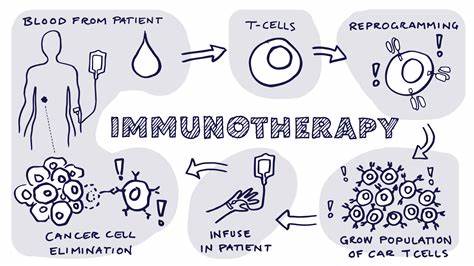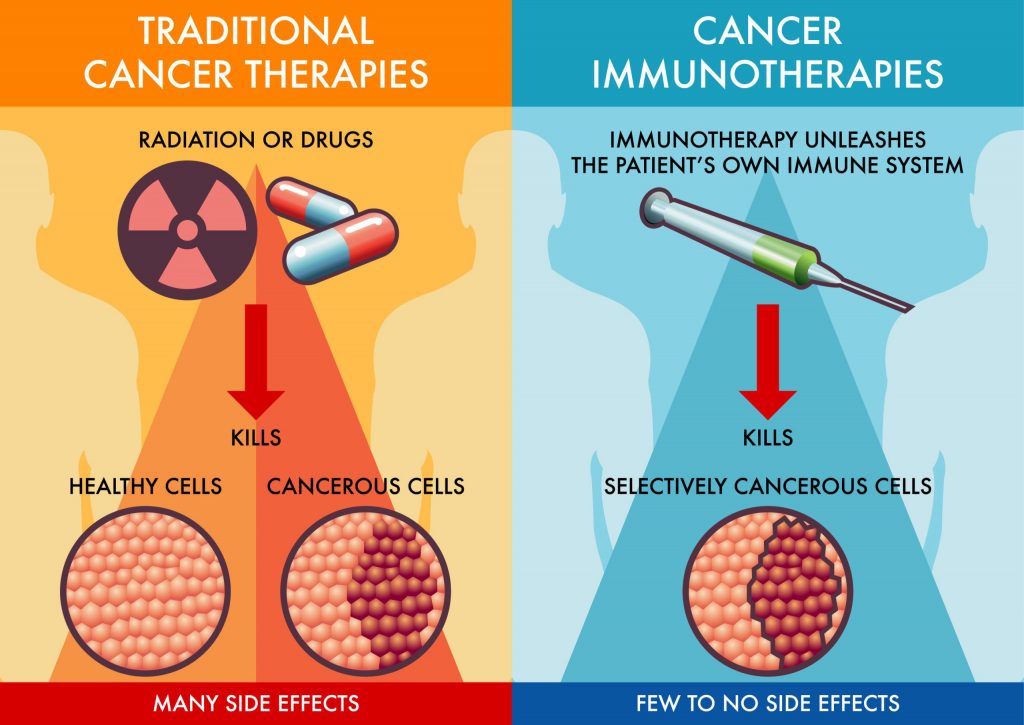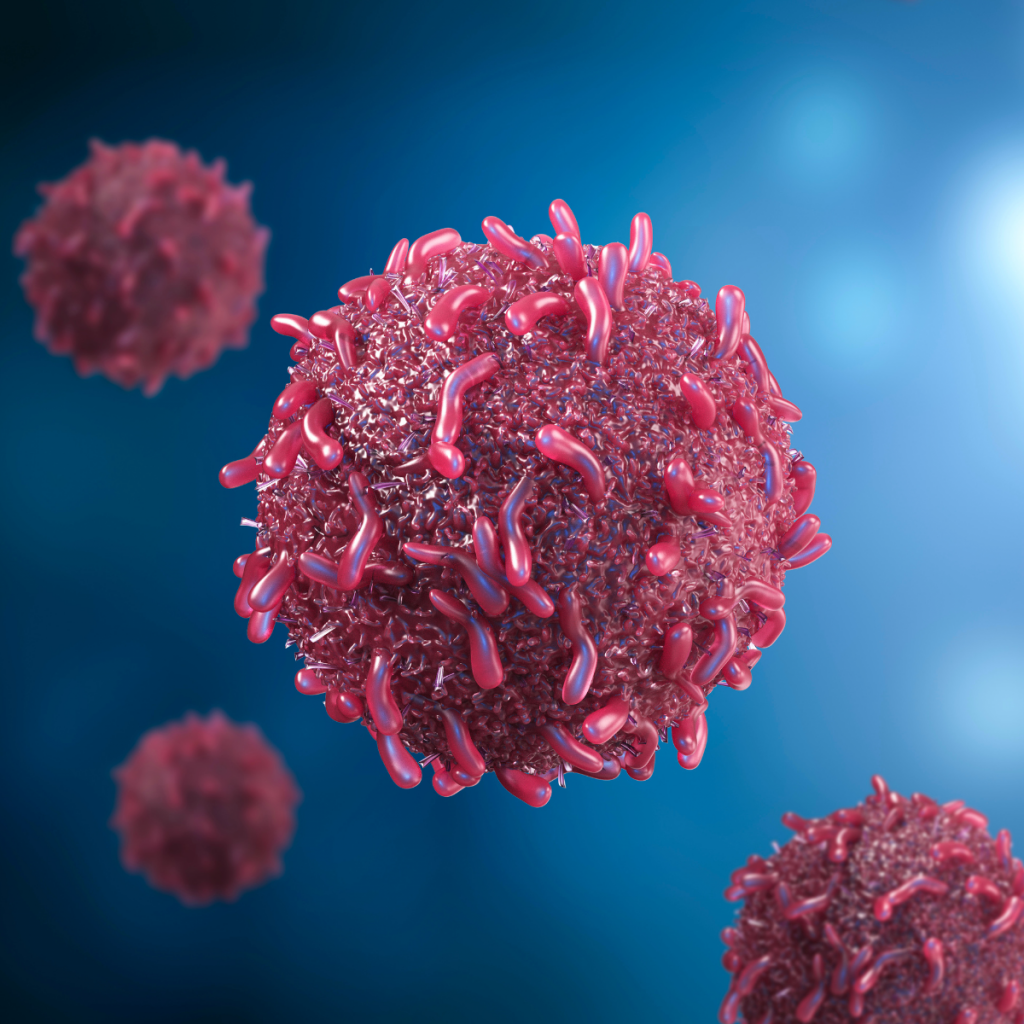Cancer treatment has evolved significantly over the years, with many breakthroughs improving survival rates and quality of life for patients. One of the most promising advancements in cancer treatment today is immunotherapy. This innovative approach harnesses the body’s immune system to fight cancer, offering hope where traditional treatments like chemotherapy and radiation have limited success. Immunotherapy is now a cornerstone in oncology, offering new ways to treat a variety of cancers, from melanoma to lung cancer. In this article, we will explore how immunotherapy works, its potential benefits, and its role in the future of cancer treatment.
1. What is Immunotherapy?
Immunotherapy is a type of cancer treatment that uses the body’s own immune system to recognize and attack cancer cells. Unlike traditional treatments that target the tumor directly, immunotherapy works by stimulating the immune system or enhancing its ability to identify and destroy cancerous cells. The immune system, which naturally fights off infections and other diseases, is often hindered by cancer cells, which can evade detection. Immunotherapy aims to break down these barriers, allowing the immune system to effectively target and eliminate cancer.

There are several types of immunotherapy, including immune checkpoint inhibitors, monoclonal antibodies, cancer vaccines, and adoptive cell therapy. Each type works in different ways but shares the same goal: to enhance the body’s natural defenses against cancer.
2. How Does Immunotherapy Work?
Immunotherapy works by either stimulating the immune system to work harder or by providing synthetic components to help the immune system better detect and attack cancer cells. Some of the most common types of immunotherapy include:
- Immune Checkpoint Inhibitors: These drugs work by blocking the proteins that prevent immune cells from attacking cancer cells. By inhibiting checkpoints such as PD-1 and CTLA-4, immune checkpoint inhibitors allow T cells to better identify and destroy cancer cells.
- Monoclonal Antibodies: These are laboratory-made molecules that can mimic the immune system’s ability to fight off harmful pathogens. They are designed to target specific antigens on cancer cells, marking them for destruction by the immune system.
- Cancer Vaccines: These vaccines stimulate the immune system to recognize and attack specific cancer-related antigens. Unlike traditional vaccines that prevent diseases, cancer vaccines help the body fight existing cancer cells.
- Adoptive Cell Therapy: In this approach, immune cells are taken from a patient’s blood, modified in the lab to enhance their cancer-fighting abilities, and then reintroduced into the body to attack cancer cells more effectively.
Each of these treatments enhances the immune system’s natural ability to fight cancer, making immunotherapy a promising and transformative approach.
3. The Benefits of Immunotherapy
Immunotherapy offers several advantages over traditional cancer treatments such as chemotherapy and radiation. Some of the key benefits include:

- Targeted Treatment: Unlike chemotherapy, which can damage healthy cells alongside cancer cells, immunotherapy is more targeted, focusing specifically on cancer cells. This reduces the risk of side effects and improves overall patient quality of life.
- Long-Term Remission: Some patients treated with immunotherapy have experienced long-term remission or even complete eradication of cancer. Because immunotherapy helps the immune system “remember” cancer cells, it may prevent recurrence for extended periods.
- Personalized Approach: Immunotherapy can be tailored to individual patients based on the type of cancer and the patient’s immune system. This personalized approach can make treatment more effective, as therapies are designed to fit the unique characteristics of each patient’s cancer.
- Combination with Other Treatments: Immunotherapy can be combined with other treatments, such as chemotherapy, radiation, or surgery, to improve outcomes. Combining treatments can help reduce the risk of cancer returning and increase overall survival rates.
4. Types of Cancer Treated with Immunotherapy
Immunotherapy has shown promise in treating a wide variety of cancers, including both common and rare forms. Some of the cancers that have benefited from immunotherapy include:
- Melanoma: One of the first cancers to see success with immunotherapy, melanoma can be effectively treated with immune checkpoint inhibitors such as pembrolizumab (Keytruda) and nivolumab (Opdivo).
- Non-Small Cell Lung Cancer (NSCLC): Immunotherapy has become a mainstay in the treatment of NSCLC, with drugs like atezolizumab (Tecentriq) and durvalumab (Imfinzi) showing significant survival benefits.
- Bladder Cancer: Drugs such as atezolizumab and pembrolizumab are approved for the treatment of bladder cancer, offering new hope for patients who previously had few options.
- Hodgkin Lymphoma: This cancer, which affects the lymphatic system, has shown promising results with immunotherapy, specifically with drugs that target PD-1 proteins.
- Head and Neck Cancers: Immunotherapy has also shown benefits in treating cancers of the head and neck, particularly in cases that have not responded well to chemotherapy.
- Cervical Cancer: Pembrolizumab is now approved for patients with advanced cervical cancer, further expanding immunotherapy’s impact.
These are just a few examples of cancers that have seen positive results from immunotherapy treatments. As research continues, more cancer types are likely to benefit from this groundbreaking approach.
5. Side Effects of Immunotherapy
While immunotherapy has revolutionized cancer treatment, it is not without its side effects. Because immunotherapy stimulates the immune system, it can cause the immune system to attack normal cells, leading to inflammation in healthy tissues. Some of the common side effects include:
- Fatigue: Many patients experience significant tiredness and lack of energy during treatment.
- Skin Rash: Some patients may develop a rash as their immune system reacts to cancer cells and healthy tissue.
- Diarrhea and Colitis: The immune system’s attack on the digestive system can lead to diarrhea and inflammation of the colon.
- Endocrine Problems: Immunotherapy can affect hormone-producing glands, leading to conditions such as thyroid problems, adrenal insufficiency, or diabetes.
- Lung Inflammation: In some cases, immunotherapy can cause inflammation in the lungs, leading to difficulty breathing or cough.
Though these side effects can be serious, they are often manageable with the help of healthcare providers. Early detection and intervention can help reduce the impact of these side effects and ensure that treatment continues smoothly.
6. The Future of Immunotherapy
The future of immunotherapy looks bright. Ongoing research continues to improve the effectiveness of current therapies while also developing new and more targeted treatments. Advances in personalized medicine and genomics are allowing for the creation of immunotherapies that are more tailored to an individual’s specific cancer and genetic makeup.

Researchers are also exploring ways to reduce the side effects of immunotherapy, making it even more accessible to a broader group of cancer patients. Furthermore, the combination of immunotherapy with other treatments, such as targeted therapy or gene therapy, is showing promising results in clinical trials.
As immunotherapy continues to evolve, it is expected to become an even more integral part of cancer care, offering patients new hope for both treatment and remission.
Conclusion
Immunotherapy has already transformed cancer treatment and holds the promise of even greater advancements in the years to come. By harnessing the power of the immune system, immunotherapy is offering a new approach to fighting cancer with fewer side effects and better long-term outcomes. With continued research and development, immunotherapy may one day provide a cure for many cancers, offering patients the hope of a healthier, cancer-free future. As science progresses, immunotherapy is undoubtedly the future of cancer medicine, bringing us closer to a world where cancer is no longer a deadly disease.

Leave a Reply